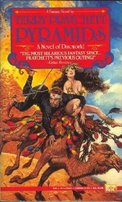
| Series: | Discworld #7 |
| Publisher: | Roc |
| Copyright: | 1989 |
| Printing: | December 1989 |
| ISBN: | 0-451-45044-2 |
| Format: | Mass market |
| Pages: | 298 |
This is the seventh novel of the very long-running Discworld series, but it's also one of the approved starting points. Pyramids only shares a few characters with prior books and doesn't require knowledge of any of the previous books to understand or appreciate. Unfortunately, it's also one of the weaker Discworld books, at least to my taste.
I first started reading the Discworld novels in the early and mid 1990s, got as far as The Colour of Magic, The Light Fantastic, Mort, and this book. Of those, the only one that grabbed me was Mort, and with that ratio I put the series aside for a while. I've since come back to the series, read more, and seen more of what everyone else likes about them. This is therefore a re-read, and I was curious to see if Pyramids would grab me more than it did the first time.
The book starts, after some introduction, with Teppic, the heir to the river kingdom of Djelibeybi. Djelibeybi is an ancient kingdom best known for its innumerable pyramids and for being a buffer zone between two much larger countries that otherwise would be at war. Everything in Djelibeybi has been done the same for thousands of years, and Teppic has escaped the country (temporarily at least) to train in Ankh-Morpork to be an assassin.
This early section was, I thought, the best part of the book. Pratchett's description of Teppic's final exam strikes a lovely balance between humor and tension, interspersed with Teppic's background and a bit of history of Djelibeybi. The Annotated Pratchett File says that the assassination exam is one of Pratchett's favorite bits, and it shows. Unfortunately (at least for my enjoyment), Teppic's sojourn in the outside world is short, and he's called back to Djelibeybi to become king and god when his father dies. The rest of the book is spent in or around that kingdom, dealing with Teppic's father's oversized pyramid and the repercussions of building it.
This isn't a bad book. It has some great moments, such as anything to do with the greatest mathematician on Discworld; those bits salvaged much of the book for me. Pratchett's take on pyramid technology is also fun and occasionally ingenious. But most of the book is a fight between tradition and something more sensible, and I got extremely tired of the priest Dios, and of Teppic's father moping around invisibly. None of the characters, other than the mathematician and Teppic when he acted like an assassin and not like a confused teenager, inspired me to want to read about about them. Pyramids is full of mummy jokes, jokes about handmaidens, and a storm of wisecracks about gods, but it fails somewhat as an engrossing story.
If you like gag-laden early Pratchett, you'll probably enjoy this. The mathemetician makes Pyramids worth reading just for the parts he's in (which is approximately the second half of the book). But by the standards of some of the other Discworld novels, it's weak and a bit slight. I was hoping I'd like it more on re-reading than in memory, but my memory turned out to be about right.
Followed by Guards! Guards! in the chronological sense and (later) by Small Gods in the plot sense.
Reviewed: 2010-10-16